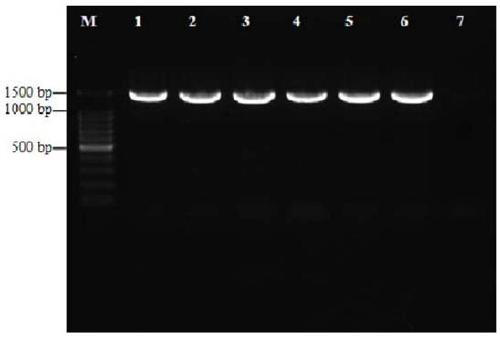Lactobacillus plantarum and application thereof
A Lactobacillus plantarum, animal technology, applied in the field of microorganisms, can solve the problems of reducing the reproductive productivity of livestock and poultry, aggravating the morbidity or mortality of livestock and poultry, bacterial food poisoning, etc. Strong sex, good adhesion effect
- Summary
- Abstract
- Description
- Claims
- Application Information
AI Technical Summary
Problems solved by technology
Method used
Image
Examples
Embodiment 1
[0033] Example 1 Bacterial Strain Isolation and Purification
[0034] Lactobacillus plantarum PA01 was found in lactic acid bacteria isolated from traditional kimchi soaking solution in Yangling, Shaanxi.
[0035] Take 50g of the fermented kimchi purchased under aseptic conditions, and carry out 10-fold gradient dilution with a PBS solution with a pH of 7.4, and the dilution gradient is 10 2 ~10 6 , after the dilution was completed, 200 μL each was spread on the MRS solid medium (containing 2.0% CaCO 3 ), and cultured upside down in an anaerobic environment at 37°C for 48h. Then, single colonies with different sizes and shapes of calcium-dissolving circles were picked and inoculated on MRS liquid medium, and cultivated overnight at 37°C. Mix the liquid medium evenly, use an inoculation loop to dip a small amount of bacterial liquid in the ultra-clean workbench and streak it onto the MRS solid medium, and culture it upside down in an anaerobic environment at 37°C for 36-48 h...
Embodiment 2
[0037] The detection of the antibacterial ability of embodiment 2 lactobacillus plantarum PA01
[0038] After shaking the pathogenic bacteria for 10 hours, inoculate the LB solid medium at about 45°C with an inoculum of 0.1%; place the sterilized and dried Oxford cup in a petri dish; add about 25mL of LB solid medium containing pathogenic bacteria; after standing at room temperature for 1 hour, use sterilized tweezers to hold the Oxford cup without destroying the structure of the culture hole, and then place it in the ultra-clean workbench at room temperature for 1 hour; add 200 μL of Lactobacillus cultured for 20 hours, after the bacteria were completely absorbed at room temperature, cultured overnight at 37°C, the diameter of the inhibition zone was measured, and the antibacterial effect of Lactobacillus was indicated by the diameter of the inhibition zone.
[0039] When Escherichia coli (S.aureus ATCC 29213), Salmonella (Salmonella enteritidis (S.Enteritidis ATCC 13076) and...
Embodiment 3
[0043] Example 3 Detection of Lactobacillus plantarum PA01 resistance to gastrointestinal environment
[0044] Acid resistance test
[0045] Bring the concentration to about 10 8 ~10 9 Add 150μL of CFU / mL Lactobacillus plantarum suspension into 4.85mL acidic MRS liquid medium with pH 2.5; after mixing the medium, culture it statically in a sterile anaerobic environment at 37°C for 3 hours; suspend Lactobacillus plantarum PA01 10-fold dilution to 10 5 ~10 6 CFU / mL, add 500 μL of Lactobacillus plantarum suspension to the petri dish respectively; pour the MRS solid medium cooled to about 45°C into the petri dish and mix well, let it cool naturally for 30 minutes and place it in an anaerobic sterile environment at 37°C Cultured in medium for 48h, the concentration of Lactobacillus plantarum was detected to be 10 8.41 CFU / mL, and maintain normal culture 10 8.65 CFU / mL was almost the same activity.
[0046] Bile salt resistance test
[0047] Bring the concentration to about ...
PUM
 Login to View More
Login to View More Abstract
Description
Claims
Application Information
 Login to View More
Login to View More - R&D
- Intellectual Property
- Life Sciences
- Materials
- Tech Scout
- Unparalleled Data Quality
- Higher Quality Content
- 60% Fewer Hallucinations
Browse by: Latest US Patents, China's latest patents, Technical Efficacy Thesaurus, Application Domain, Technology Topic, Popular Technical Reports.
© 2025 PatSnap. All rights reserved.Legal|Privacy policy|Modern Slavery Act Transparency Statement|Sitemap|About US| Contact US: help@patsnap.com



